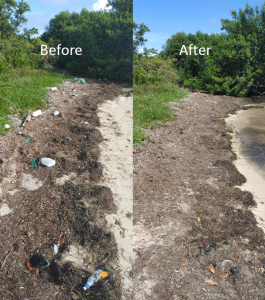Every year, we celebrate our planet in honor of Earth Month. This month, I’d like to bring some awareness to challenges that the Earth faces as a result of a growing human population, and ways to help combat these challenges. They are not insurmountable.
Marine debris is human-generated waste items that end up in the water. This debris stems from two input sources: land-based sources (trash that is discarded on the streets, enters a storm drain, ends up in our stormwater system) and boat-based debris (fishing items such as monofilament, trap lines, bottles, cans, etc.). In Miami-Dade County, an area wholly connected by water from the furthest western reaches to the east (Biscayne Bay and the Atlantic Ocean), marine debris is a growing issue.

A recent Circularity Assessment Protocol performed by the University of Georgia in the City of Miami found that within the City, the average waste generated was 7.9 lb/person/per day, 16% of which is plastic. The U.S. average is 4.9 lb/person/day, 12% of which is plastic. Those statistics are alarming, and only account for City of Miami (population 400,000) and do not include the rest of Miami-Dade County (population 2.7 million). Furthermore, data collected in 2021’s International Coastal Cleanup reflected 17, 771 lbs of debris removed in a single day from Miami-Dade County alone (volunteercleanup.org). These items only reflect what reaches land-accessible areas and do not reflect the debris that we cannot see-the materials that sink to the bottom of the Bay and the ocean. We can do better as a city, a County, and as the Sunshine State.
What can we do?
The good news is that there are many action steps we can take to help reduce our own debris inputs. The following reflect just a few:
Source reduction: reducing our dependence on single-use items is a really small but impactful solution. After all, if you don’t obtain an item, you won’t need to throw it out, right? This can include saying no to a straw when you got eat at a restaurant, bringing your own reusable grocery bags when you shopping, and even bringing your own Tupperware containers for take-home leftovers while dining out.
Dispose of items properly: Miami-Dade County Department of Solid Waste provides an A-Z guide of what is trash, what is recyclable, and what needs to be taken to a special facility. These include items like paint, oils, and batteries which should not be disposed of in general waste.
Review your recycling facts: https://www.miamidade.gov/global/service.page?Mduid_service=ser1494966732017925 Not everything is recyclable, and non-suitable items mixed in will contaminate the entire batch of recycling.
If you see something, say something! Report illegal dumping by calling 311 or submitting a report via this online portal.
Together, we can help reverse the current status of marine debris in Miami-Dade County.
 2
2
